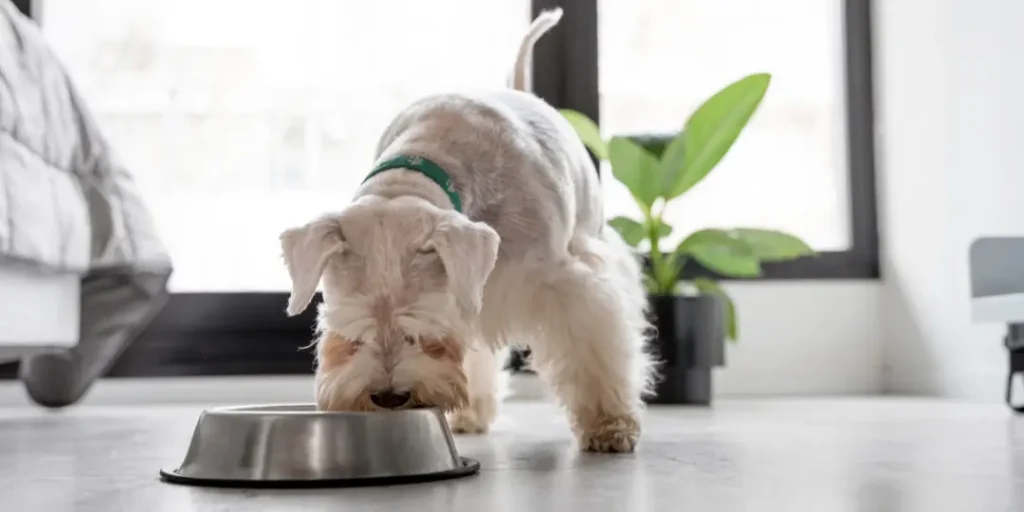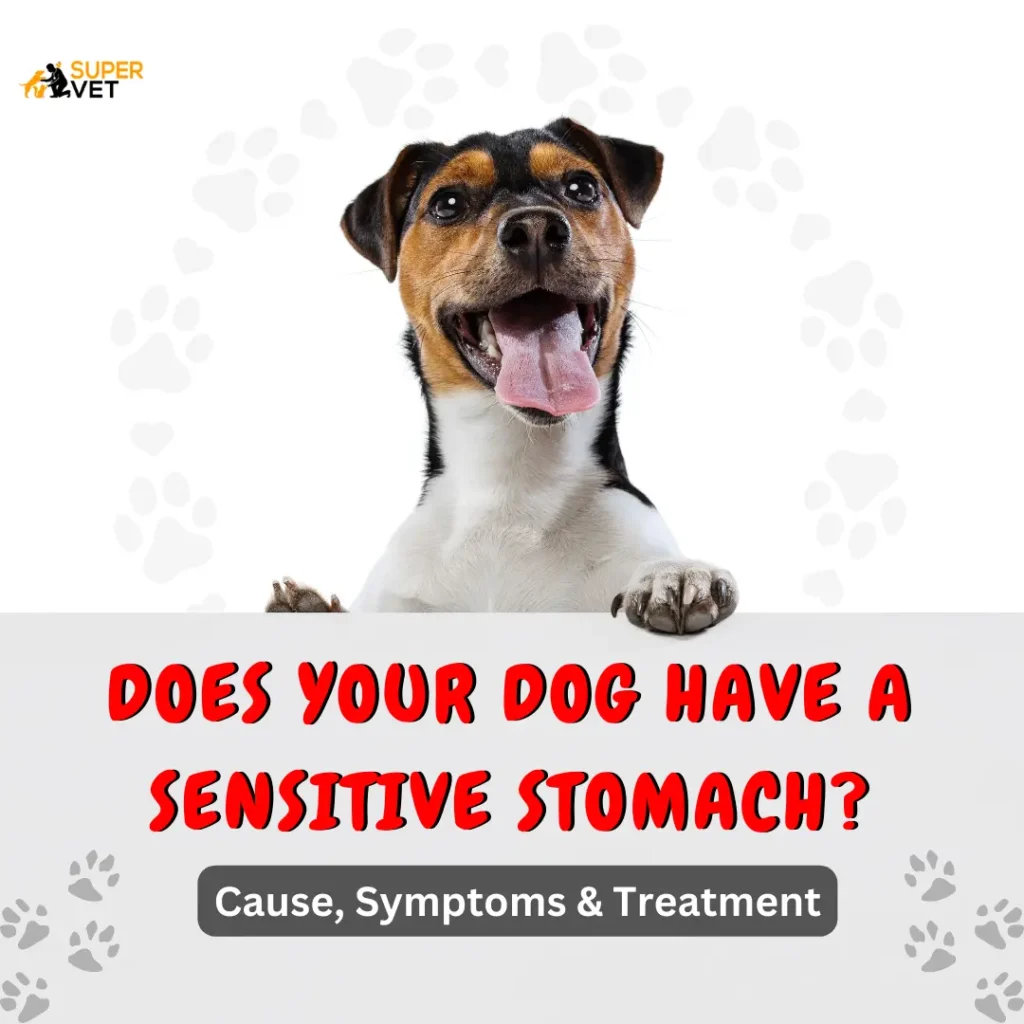A blog post on your dog has a sensitive stomach and a detailed description of causes, symptoms, and treatments.
Some dogs will digest anything that goes in their stomachs without an issue, including whole rolls of toilet paper. Yes, while dogs seem like they are capable of eating anything, and anything, they really may have sensitive stomachs. Because garbage and plants, particularly plants that are toxic to dogs, do not belong in their stomachs, many sensitivities are caused.
Of course, any breed can have sensitive tummies, and if you think that your dog might be having problems, you will want to see a vet for some professional advice.
Common signs of a sensitive stomach in dogs include nausea, occasional loose stool, and occasional diarrhea.
Cause of sensitive stomach

Some dogs develop digestive intolerances to ingredients in their food, leading to GI signs like vomiting or diarrhea. Even the slightest changes to their diet, be they in foods or treats, may cause these dogs to experience digestive discomfort. A sudden change in diet may exacerbate the digestive problems of your dog, making symptoms harder to treat.
Other causes may include;
- eating certain dog foods too fast
- changing their diet
- sensitivities to specific foods
- bacteria infections/parasites
- Intestinal bacterial imbalances
- issues with food sensitivities
- even stress caused by separation anxiety may lead your dog to develop a sensitive stomach.
- Viruses, like parvovirus, or parasites can upset your dog’s stomach when it is exposed to the feces of another animal that is contaminated.
If your dog has slurred stool when you take him outside or sometimes throws up after eating, those are minor symptoms that are probably caused by a sensitive stomach
Symptoms of the sensitive stomach in Dogs

Diarrhea, gas, and vomiting can happen for a variety of reasons, and you will want to get a vet to rule out other medical reasons your dog is experiencing symptoms before you decide that your canine companion just has a sensitive stomach.
Unresolved parasites or bacteria infections may make your dog’s stomach more sensitive, meaning that he might do well with a mild meal, only to trudge back out when given something a bit more difficult to digest.
Several symptoms need immediate attention from your veterinarian.
- Lack of appetite
- Nausea
- Vomiting
- Excessive gas (Farting or burping)
- Diarrhea
- Blood in stool
- Decreased mobility
- Fever
- Excessive stomach growling
Treatment of sensitive stomach

If your dog has a sensitive or upset stomach, there are ways to handle it at home. however, several symptoms need immediate attention from your veterinarian.
You should determine which exact ingredients are causing the dog’s stomach issues. Once you have a long list of approved foods you know will not upset your dog’s stomach, you can search for a full-balanced dog food that includes just these ingredients.
Diet:
If your dog frequently has a sensitive stomach or GI tract, your vet can recommend a diet that includes high-digestible ingredients, with a balance of fiber and supporting nutrients, such as omega-3 fatty acids. If your pooch is still having a stomach ache, avoiding foods may help with most symptoms, such as frequent diarrhea and vomiting.
Medication:
If your dog has an ulcer in the GI system, medicines will be given to relieve the ulcer and apply a protective coating to it. This will help your dog recuperate faster and be more comfortable. To help your dog’s digestive tract, anti-vomiting medicine will be given.
Supplement:
Adding supplements to your dog’s diet can help keep his digestive system in good shape. By adding probiotics, fiber, and other nutrients, you can help ensure that your dog stays healthy and has regular bowel movements.
Food that can irritate the stomach

Every dog is a special creature. Several breeds of dogs are capable of digesting almost anything, while others are bothered by even the slightest change in diet. Here is the following list of food that may cause stomach problems in your Dog-
- Protein: Some pups have trouble digesting particular forms of protein. If your dog is on a chicken-based diet, for example, consider moving to a different protein source, such as lamb or fish, to see if the problem goes away.
- Fiber: sometimes dogs need a little more fiber in their diets. Beet pulp is a rich source of fiber for dogs. It can improve fecal quality without lowering other nutrient digestibility.
- Fats: High-fat diets are more challenging to digest than low-fat or high-carbohydrate diets. You should check the ingredients in your dog’s present diet for fats and oils. Noted down the food that is too heavy in fat for your dog’s digestive system to handle. Compare the fat content of your current food with heavy food. You should try to locate a fat-free option.
- Minerals & Vitamines: Most commercial dog diets have enough vitamins and minerals in their recipes. However, if you provide a particular diet to your dogs, such as a raw diet or a freshly cooked dinner. Your dog may be lacking in some nutrients. You should confer with your veterinarian to confirm that you are feeding your dog all of the required nutrients.
Food to Avoid at all Costs

As a responsible pet owner, you should avoid certain foods at all costs to protect your furry friend. Here are the following foods you should evade:
- Chocolate: This food contains a chemical called “theobromine”, as well as an artificial sweetener called “Xylitol”, which is safe for humans but dangerous for dogs. It can cause your dog to vomit, have diarrhea, and drink water excessively.
- Salty Food: Consuming salty food can cause salt poisoning, also called sodium ion poisoning, which causes excessive thirst and urine production. Eating salty meals can induce vomiting, high body temperature, seizures, diarrhea, and bloating as a result of the excessive water your dog drinks to satisfy his thirst.
- Fried & Fatty Meat: High-fat diets can cause Pancreatitis and gastrointestinal irritation in dogs due to the high salt content. Make sure your meat is well cooked at all times. You should not serve raw or undercooked food to your dog as this causes stomach problems. So you have to make sure that meat is well cooked at all times.
- Milk and Dairy: Many dogs suffer from lactose intolerance, which means they lack the enzyme required to break down milk sugar. Dairy can also cause vomiting, diarrhea, and gastrointestinal disorders in dogs.
Conclusion:

If you can discover one or more feasts that your dog can digest well without trouble. So you should give them exclusively those foods. With these precautions, stomach sensitivity should no longer be a concern for them.
There are several options available for dogs with upset stomachs to help them feel better quickly. You can assist your dog get over an upset stomach with the help of your veterinarian and get back to being their happy selves!
Supervet provides the best Online Pet Services in Kota where you can also consult with vets about your dog’s health and take guidance from them.

